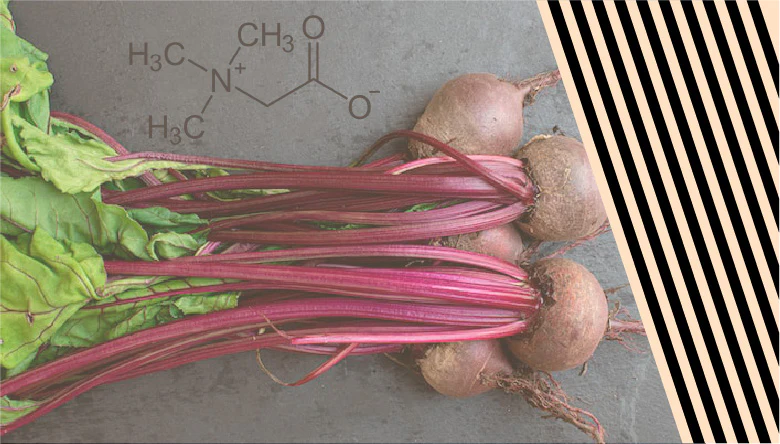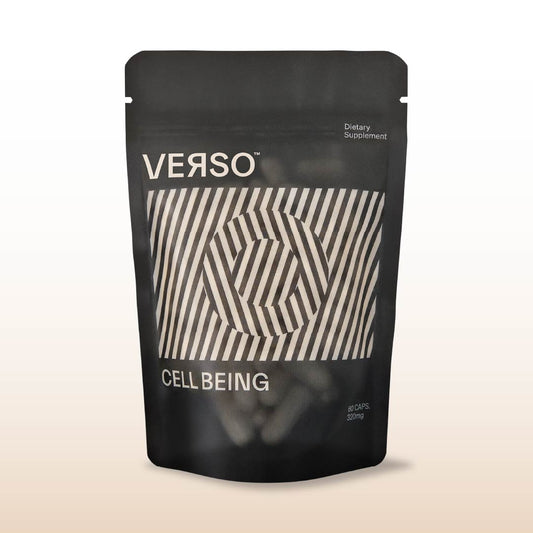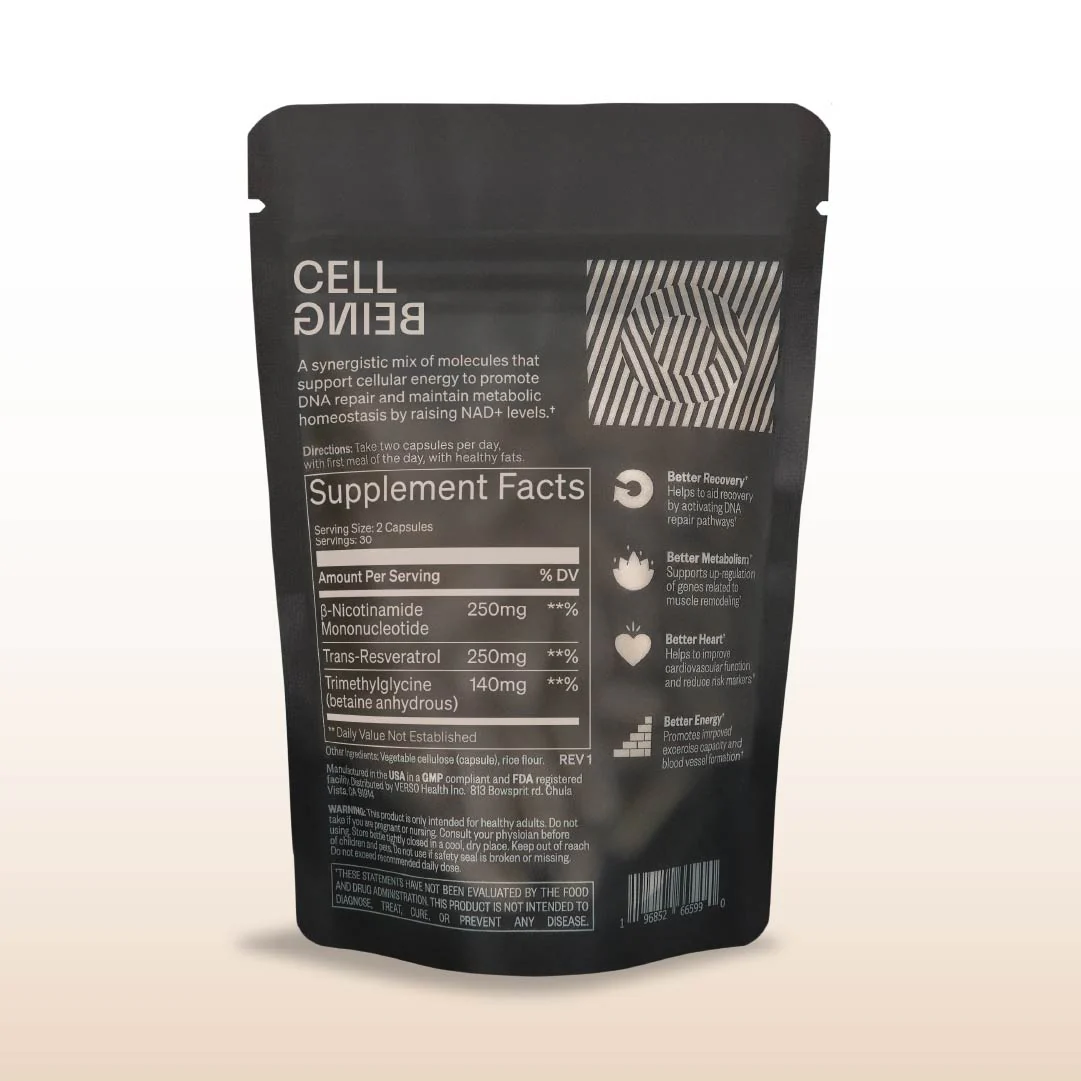
What is TMG?
TMG stands for trimethylglycine, but is also known as betaine. TMG is produced by the body and found in foods like beetroot, wheat, quinoa, and seafood (1). As a supplement, TMG has been used primarily to optimize athletic performance and to improve heart health. It also plays a role in methylation, which is central to DNA health(2). TMG has anti-inflammatory properties as well as heart, and metabolic-supportive qualities that are therapeutic for disease.
TMG has two main functions. It is an osmolyte, which means that it regulates intracellular osmotic pressure, which strengthens protein function and protects cells from osmotic stress (3 -6 ). It is also a methyl-group donor, meaning that it helps to maintain normal methylation activity for optimal DNA health (7).
What are some of the main mechanisms?
TMG confers health benefits through several mechanisms. While inflammation is a necessary immune reaction to promote healing, prolonged or chronic inflammation is an underlying factor across most diseases of aging. TMG has been noted to combat inflammation and aging pathophysiology by increasing the activity of antioxidant agents, increasing the metabolism of sulfur amino acids (8), inhibiting NFkB and inflammasome-related proteins (9-11), positively impacting the methylation of nucleic acids and proteins (12), and restoring energy metabolism balance. Animal research also suggests that TMG mediates endoplasmic reticulum stress to reduce inflammation (13). This is beneficial as ER stress can lead to cellular death, or apoptosis – a process involved in the pathogenesis of inflammatory diseases and diseases of aging. All of these factors are essential to TMG’s anti-inflammatory and longevity effects (14).
These mechanisms contribute to TMG’s health benefits across several human diseases including but not limited to: obesity, diabetes, cancer and dementia (14).
TMG and Heart Health
Research has suggested that TMG may decrease the risk for heart disease. While the research is conflicting, the main reason TMG is thought to benefit heart health is due to its ability to decrease levels of the amino acid homocysteine in blood. When levels of homocysteine are too high, risk for heart disease increases and blood vessels are at risk of damage (15, 16). A review of studies in healthy adults found that 6 weeks of daily TMG supplementation (4 grams) lead to a decrease in homocysteine blood levels (17). However, TMG supplementation may negatively impact other risk factors for heart disease, thus more research is needed for clarification (18, 19). Animal studies have also found that TMG may suppress NF-kB activity which could otherwise contribute to atherogenesis (20-23).
TMG and Liver Health
For humans and animals alike, betaine has been found to enhance liver function for those with fatty liver disease and steatohepatitis (1, 24-26). This is likely due to TMG’s action as a methyl donor to homocysteine.
TMG and Gut Health
TMG’s activity as a methyl donor is also associated with better intestinal barrier function (7, 27). Animal research has also suggested that TMG can improve microbiome diversity, activate digestive enzymes and strengthen intestinal structure (28). More studies are needed to investigate similar effects for humans.
TMG and Cancer
There is also a body of human research which suggests that TMG is beneficial for cancers including breast cancer, lung cancer, liver cancer, colorectal cancer and nasopharyngeal carcinoma (37-41). A consensus of research in this area has found that higher intake of TMG decreases the risk for cancer. However, the majority of these studies have been case-control studies which are not the golden standard in study design. There is a need for randomized controlled trials to support these findings.
TMG and Brain Health
In human studies, TMG supplementation has been shown to mediate a hallmark of Alzheimer’s disease, hyperhomocysteinemia (42). Another study found that TMG supplementation could improve inflammatory response for those with Alzheimer’s disease (43). Animal studies have also found that TMG can suppress NF-kB activity which could otherwise contribute to neural injury (22-23). A greater body of research is needed to solidify this basis of evidence.
TMG and Athletic Performance
Research suggests that TMG supplementation may enhance athletic performance. A review found that TMG supplements may enhance body composition as well as both resistance and endurance exercise performance (44). However, another review suggested mixed results (45). The mechanisms for potential exercise performance enhancement are unknown but may be due to TMG-induced increased synthesis of creatine, increased protein production and reduced fatigue (44).
TMG and Metabolic Health
Both animal and human research have suggested that TMG supplementation has beneficial effects on metabolic health. These studies have found that TMG levels are inversely correlated with body fat percentages. For instance, higher TMG level correlates with lower body fat percentage. However, in research this has only been found to hold true for men; more research is needed (29-33). It is important to note that this area is still under exploration and overall, results are positive but conflicting (34-36).
Additionally, a study in mice fed a high fat diet showed that TMG enhanced the metabolism of fat and improved insulin sensitivity (46). Similarly, a study with 2,400 participants found that those who had a higher intake of both choline and TMG had improved insulin sensitivity, and lower fasting glucose (47). Since insulin resistance and high fasting glucose are signs of poor glucose regulation and an increased risk for metabolic conditions, these benefits are significant (48).
Overall, research has suggested that TMG positively contributes to improved lipid and glucose metabolism (49, 50). TMG likely restores an imbalance between fat synthesis and oxidation to prevent fat accumulation (51-53). Animal research has shown that this may be due to involvement of increased AMP-activated protein kinase (AMPK) activity (54). AMPK is an energy sensor and a potent regulator of metabolic homeostasis. Increased AMPK likely contributes to reduced lipogenesis, lipid accumulation, and enhanced glucose uptake and insulin sensitivity (55-56). However, more research is needed.
Dosage
The dosage of TMG supplements used in most studies is typically between 500-9,000 mg/day (44). However, research suggests that up to 9-15 g/day is safe for humans (1).
Conclusion
TMG is suggested to have major health promoting physiological effects for the heart, cardiorespiratory, liver, brain and gut health, as well as for the prevention of metabolic conditions and cancer. These beneficial impacts are due to TMGS properties as both an osmoprotectant and methyl-group donor, as well as TMGs abilities to combat inflammation, oxidative stress, and endoplasmic reticulum stress, as well as to regulate apoptosis, sulfur amino acid metabolism and methylation. More research on TMG is warranted, as the benefits may confer alleviation for the pathophysiologies of various diseases.

Author: Jacqueline Seymour
Jacki is a Master’s student at USC, home of Dr. Valter Longo’s Longevity Institute, where she’s studying her passion for life: Gerontology(the science of aging) and Nutrition.
Resources:
- Craig SA. Betaine in human nutrition. Am J Clin Nutr. 2004 Sep;80(3):539-49. doi: 10.1093/ajcn/80.3.539. PMID: 15321791.
- Zinovkina LA, Zinovkin RA. DNA Methylation, Mitochondria, and Programmed Aging. Biochemistry (Mosc). 2015 Dec;80(12):1571-7. doi: 10.1134/S0006297915120044. PMID: 26638681.
- Craig, S.A.S. Betaine in human nutrition. Am. J. Clin. Nutr. 2004, 80, 539–549.
- Willingham, B.D.; Ragland, T.J.; Ormsbee, M.J. Betaine Supplementation May Improve Heat Tolerance: Potential Mechanisms in Humans. Nutrients 2020, 12, 2939.
- Wettstein, M.; Weik, C.; Holneicher, C.; Häussinger, D. Betaine as an osmolyte in rat liver: Metabolism and cell-to-cell interactions. Hepatology 1998, 27, 787–793.
- Konstantinova, S.V.; Tell, G.S.; Vollset, S.E.; Nygård, O.; Bleie, Ø.; Ueland, P.M. Divergent associations of plasma choline and betaine with components of metabolic syndrome in middle age and elderly men and women. J. Nutr. 2008, 138, 914–920.
- Arumugam MK, Paal MC, Donohue TM Jr., Ganesan M, Osna NA, Kharbanda KK. Beneficial Effects of Betaine: A Comprehensive Review. Biology. 2021; 10(6):456. https://doi.org/10.3390/biology10060456
- Barak AJ, Beckenhauer HC, Mailliard ME, Kharbanda KK, Tuma DJ. Betaine lowers elevated s-adenosylhomocysteine levels in hepatocytes from ethanol-fed rats. J Nutr (2003) 133(9):2845–8. 10.1093/jn/133.9.2845
- Monaco C, Andreakos E, Kiriakidis S, Mauri C, Bicknell C, Foxwell B, et al. Canonical pathway of nuclear factor kappa B activation selectively regulates proinflammatory and prothrombotic responses in human atherosclerosis. Proc Natl Acad Sci U S A (2004) 101(15):5634–9. 10.1073/pnas.0401060101
- Aravilli RK, Vikram SL, Kohila V. Phytochemicals as potential antidotes for targeting NF-κB in rheumatoid arthritis. 3 Biotech (2017) 7(4):253. 10.1007/s13205-017-0888-1
- Schuliga M. NF-kappaB signaling in chronic inflammatory airway disease. Biomolecules (2015) 5(3):1266–83. 10.3390/biom5031266
- Tehlivets O. Homocysteine as a risk factor for atherosclerosis: is its conversion to s-adenosyl-L-homocysteine the key to deregulated lipid metabolism? J Lipids (2011) 2011(2011):702853. 10.1155/2011/702853
- Schröder M, Kaufman RJ. ER stress and the unfolded protein response. Mutat Res (2005) 569(1):29–63. 10.1016/j.mrfmmm.2004.06.056
- Zhao, G., He, F., Wu, C., Li, P., Li, N., Deng, J., Zhu, G., Ren, W., & Peng, Y. (2018). Betaine in Inflammation: Mechanistic Aspects and Applications. Frontiers in immunology, 9, 1070. https://doi.org/10.3389/fimmu.2018.01070
- LiverTox: Clinical and Research Information on Drug-Induced Liver Injury [Internet]. Bethesda (MD): National Institute of Diabetes and Digestive and Kidney Diseases; 2012-. Betaine. [Updated 2017 Sep 26]. Available from: https://www.ncbi.nlm.nih.gov/books/NBK548774/
- Ganguly, P., & Alam, S. F. (2015). Role of homocysteine in the development of cardiovascular disease. Nutrition journal, 14, 6. https://doi.org/10.1186/1475-2891-14-6
- McRae M. P. (2013). Betaine supplementation decreases plasma homocysteine in healthy adult participants: a meta-analysis. Journal of chiropractic medicine, 12(1), 20–25. https://doi.org/10.1016/j.jcm.2012.11.001
- Zawieja EE, Zawieja B, Chmurzynska A. Betaine Supplementation Moderately Increases Total Cholesterol Levels: A Systematic Review and Meta-Analysis. J Diet Suppl. 2021;18(1):105-117. doi: 10.1080/19390211.2019.1699223. Epub 2019 Dec 6. PMID: 31809615.
- Zeisel SH. Betaine supplementation and blood lipids: fact or artifact? Nutr Rev. 2006 Feb;64(2 Pt 1):77-9. doi: 10.1301/nr.2006.feb.77-79. PMID: 16536184.
- Go EK, Jung KJ, Kim JY, Yu BP, Chung HY. Betaine suppresses proinflammatory signaling during aging: the involvement of nuclear factor-kappaB via nuclear factor-inducing kinase/IkappaB kinase and mitogen-activated protein kinases. J Gerontol (2005) 60(10):1252. 10.1093/gerona/60.10.1252
- Lee EK, Jang EJ, Jung KJ, Kim DH, Yu BP, Chung HY. Betaine attenuates lysophosphatidylcholine-mediated adhesion molecules in aged rat aorta: modulation of the nuclear factor-κB pathway. Exp Gerontol (2013) 48(5):517. 10.1016/j.exger.2013.02.024
- Yi EY, Kim YJ. Betaine inhibits in vitro and in vivo angiogenesis through suppression of the NF-kappaB and Akt signaling pathways. Int J Oncol (2012) 41(5):1879–85. 10.3892/ijo.2012.1616
- Li JM, Ge CX, Xu MX, Wang W, Yu R, Fan CY, et al. Betaine recovers hypothalamic neural injury by inhibiting astrogliosis and inflammation in fructose-fed rats. Mol Nutr Food Res (2015) 59(2):189–202. 10.1002/mnfr.201400307
- Mato JM, Martinez-Chantar ML, Lu SC: Methionine Metabolism and Liver Disease. Annu Rev Nutr 2008;28:273-293.
- Kwon DY, Jung YS, Kim SJ, Park SJ, Park JH, Kim YC: Impaired sulfur-amino acid metabolism and oxidative stress in nonalcoholic fatty liver are alleviated by betaine supplementation in rats. J Nutr 2009;139:63-68.
- Abdelmalek MF, Angulo P, Jorgensen RA, Sylvestre PB, Lindor KD: Betaine, a promising new agent for patients with nonalcoholic steatohepatitis: results of a pilot study. Am J Gastroenterol 2001;96:2711-2717.
- Thomes, P.G.; Osna, N.A.; Bligh, S.M.; Tuma, D.J.; Kharbanda, K.K. Role of defective methylation reactions in ethanol-induced dysregulation of intestinal barrier integrity. Biochem. Pharmacol. 2015, 96, 30–38.
- Wang, H.; Li, S.; Fang, S.; Yang, X.; Feng, J. Betaine Improves Intestinal Functions by Enhancing Digestive Enzymes, Ameliorating Intestinal Morphology, and Enriching Intestinal Microbiota in High-salt stressed Rats. Nutrients 2018, 10, 907.
- Huang QC, Xu ZR, Han XY, Li WF. Changes in hormones, growth factor and lipid metabolism in finishing pigs fed betaine—livestock science. Livest Sci (2006) 105(1):78–85. 10.1016/j.livsci.2006.04.031
- He S, Zhao S, Dai S, Liu D, Bokhari SG. Effects of dietary betaine on growth performance, fat deposition and serum lipids in broilers subjected to chronic heat stress. Anim Sci J (2015) 86(10):897. 10.1111/asj.12372
- Konstantinova SV, Tell GS, Vollset SE, Nygård O, Bleie Ø, Ueland PM. Divergent associations of plasma choline and betaine with components of metabolic syndrome in middle age and elderly men and women. J Nutr (2008) 138(5):914. 10.1093/jn/138.5.914
- Chen YM, Liu Y, Liu YH, Wang X, Guan K, Zhu HL. Higher serum concentrations of betaine rather than choline is associated with better profiles of DXA-derived body fat and fat distribution in Chinese adults. Int J Obes (2014) 39(3):465. 10.1038/ijo.2014.158
- Gao X, Randell E, Zhou H, Sun G. Higher serum choline and betaine levels are associated with better body composition in male but not female population. PLoS One (2018) 13(2):e0193114. 10.1371/journal.pone.0193114
- Schwab U, Törrönen A, Toppinen L, Alfthan G, Saarinen M, Aro A, et al. Betaine supplementation decreases plasma homocysteine concentrations but does not affect body weight, body composition, or resting energy expenditure in human subjects. Am J Clin Nutr (2002) 76(5):961. 10.1093/ajcn/76.5.961
- Favero SD, Roschel H, Artioli G, Ugrinowitsch C, Tricoli V, Costa A, et al. Creatine but not betaine supplementation increases muscle phosphorylcreatine content and strength performance. Amino Acids (2012) 42(6):2299–305. 10.1007/s00726-011-0972-5
- Gao X, Wang Y, Edward R, Pardis P, Yi Y, Wayne G, et al. Higher dietary choline and betaine intakes are associated with better body composition in the adult population of Newfoundland, Canada. PLoS One (2016) 11(5):e0155403. 10.1371/journal.pone.0155403
- Ying J, Rahbar MH, Hallman DM, Hernandez LM, Spitz MR, Forman MR, et al. Associations between dietary intake of choline and betaine and lung cancer risk. PLoS One (2013) 8(2):e54561. 10.1371/journal.pone.0054561
- Zeng F, Xu C, Liu Y, Fan Y, Lin X, Lu Y, et al. Choline and betaine intakes are associated with reduced risk of nasopharyngeal carcinoma in adults: a case–control study. Br J Cancer (2014) 110(3):808. 10.1038/bjc.2013.686
- Xu X, Gammon MD, Zeisel SH, Bradshaw PT, Wetmur JG, Teitelbaum SL, et al. High intakes of choline and betaine reduce breast cancer mortality in a population-based study. FASEB J (2009) 23(11):4022–8. 10.1096/fj.09-136507
- Lu MS, Fang YJ, Pan ZZ, Zhong X, Zheng MC, Chen YM, et al. Choline and betaine intake and colorectal cancer risk in Chinese population: a case–control study. PLoS One (2015) 10(3):e0118661. 10.1371/journal.pone.0118661
- Zhou RF, Chen XL, Zhou ZG, Zhang YJ, Lan QY, Liao GC, et al. Higher dietary intakes of choline and betaine are associated with a lower risk of primary liver cancer: a case-control study. Sci Rep (2017) 7(1):679. 10.1038/s41598-017-00773-w
- Madsen SK, Rajagopalan P, Joshi SH, Toga AW, Thompson PM. Higher homocysteine associated with thinner cortical gray matter in 803 participants from the Alzheimer’s disease neuroimaging initiative. Neurobiol Aging (2015) 36:S203–10. 10.1016/j.neurobiolaging.2014.01.154
- Sun J, Wen S, Zhou J, Ding S. Association between malnutrition and hyperhomocysteine in Alzheimer’s disease patients and diet intervention of betaine. J Clin Lab Anal (2017) 31(5):1–7. 10.1002/jcla.22090
- Cholewa JM, Guimarães-Ferreira L, Zanchi NE. Effects of betaine on performance and body composition: a review of recent findings and potential mechanisms. Amino Acids. 2014 Aug;46(8):1785-93. doi: 10.1007/s00726-014-1748-5. Epub 2014 Apr 24. PMID: 24760587.
- Ismaeel A. Effects of Betaine Supplementation on Muscle Strength and Power: A Systematic Review. J Strength Cond Res. 2017 Aug;31(8):2338-2346. doi: 10.1519/JSC.0000000000001959. PMID: 28426517.
- Du J, Shen L, Tan Z, Zhang P, Zhao X, Xu Y, Gan M, Yang Q, Ma J, Jiang A, Tang G, Jiang Y, Jin L, Li M, Bai L, Li X, Wang J, Zhang S, Zhu L. Betaine Supplementation Enhances Lipid Metabolism and Improves Insulin Resistance in Mice Fed a High-Fat Diet. Nutrients. 2018 Jan 26;10(2):131. doi: 10.3390/nu10020131. PMID: 29373534; PMCID: PMC5852707.
- Gao X, Wang Y, Sun G. High dietary choline and betaine intake is associated with low insulin resistance in the Newfoundland population. Nutrition. 2017 Jan;33:28-34. doi: 10.1016/j.nut.2016.08.005. Epub 2016 Sep 7. PMID: 27908547.
- Freeman AM, Pennings N. Insulin Resistance. 2021 Nov 15. In: StatPearls [Internet]. Treasure Island (FL): StatPearls Publishing; 2022 Jan–. PMID: 29939616.
- Kathirvel E, Morgan K, Nandgiri G, Sandoval BC, Caudill MA, Bottiglieri T, et al. Betaine improves nonalcoholic fatty liver and associated hepatic insulin resistance: a potential mechanism for hepatoprotection by betaine. Am J Physiol Gastrointest Liver Physiol (2010) 299(5):G1068. 10.1152/ajpgi.00249.2010
- Li S, Wang H, Wang X, Wang Y, Feng J. Betaine affects muscle lipid metabolism via regulating the fatty acid uptake and oxidation in finishing pig. J Anim Sci Biotechnol (2017) 8(1):72. 10.1186/s40104-017-0200-6
- Xu L, Huang D, Hu Q, Wu J, Wang Y, Feng J. Betaine alleviates hepatic lipid accumulation via enhancing hepatic lipid export and fatty acid oxidation in rats fed with a high-fat diet. Br J Nutr (2015) 113(12):1835–43. 10.1017/S0007114515001130
- Song Z, Deaciuc I, Zhou Z, Song M, Chen T, Hill D, et al. Involvement of AMP-activated protein kinase in beneficial effects of betaine on high-sucrose diet-induced hepatic steatosis. Am J Physiol Gastrointest Liver Physiol (2007) 293(4):G894. 10.1152/ajpgi.00133.2007
- Du J, Shen L, Tan Z, Zhang P, Zhao X, Xu Y, et al. Betaine supplementation enhances lipid metabolism and improves insulin resistance in mice fed a high-fat diet. Nutrients (2018) 10(2). 10.3390/nu10020131
- Song Z, Deaciuc I, Zhou Z, Song M, Chen T, Hill D, et al. Involvement of AMP-activated protein kinase in beneficial effects of betaine on high-sucrose diet-induced hepatic steatosis. Am J Physiol Gastrointest Liver Physiol (2007) 293(4):G894. 10.1152/ajpgi.00133.2007.
- Li Y, Xu S, Mihaylova M, Zheng B, Hou X, Jiang B, et al. AMPK phosphorylates and inhibits SREBP activity to attenuate hepatic steatosis and atherosclerosis in diet-induced insulin resistant mice. Cell Metab (2011) 13(4):376–88. 10.1016/j.cmet.2011.03.009
- Russell RR, III, Bergeron R, Shulman GI, Young LH. Translocation of myocardial GLUT-4 and increased glucose uptake through activation of AMPK by AICAR. Am J Physiol (1999) 277(2):643–9.
Try Us







